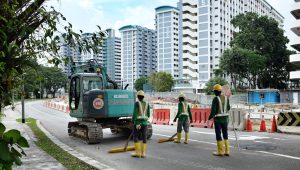In the early morning of July 18, an accident involving three lorries along the Kranji Expressway in northwest Singapore resulted in 26 migrant workers being taken to three different hospitals after sustaining minor injuries. The next day, 10 more migrant workers sustained injuries in a collision between a car and a lorry along the Kallang-Paya Lebar Expressway. Both accidents made headlines island-wide, bringing back into the spotlight a heated debate about the safety of transportation of migrant construction workers in the city-state.
A joint statement signed by over 50 civil society and community groups in Singapore denounced the inaction of the government, and called for an immediate ban on lorry rides for migrant workers, instead outlining alternatives for companies, as well as intermediary solutions for businesses needing more resources to transition away from the use of overcrowded vehicles.
“After two consecutive days of lorry accidents, we were very concerned about how many more injuries and deaths have to happen before [the Ministry of Transport (MOT)] takes action,” said Jewel Yi, co-lead of the COVID-19 Migrant Support Coalition (CMSC), a volunteer group that emerged to help address the needs of migrant workers at the height of the COVID-19 pandemic in Singapore.
She said that the two accidents were the reason for the release of the statement, which was co-drafted with Humanitarian Organization for Migration Economics (HOME), a migrant workers’ rights advocacy group, which coordinated the signing of the letter among various civil society organizations and community groups across the city-state.
The community statement prompted a joint response from over 25 companies and business groups employing lorries to ferry migrant laborers to and from work, warning that a shift away from lorry transportation involves “real, practical, and operational complexities.” It added that it was “essential to acknowledge that society must be ready to accept a change in the social compact,” effectively disregarding safety concerns brought forward by migrant workers advocacy groups.
The response from business groups garnered attention online after diplomat and lawyer Tommy Koh took to social media to criticize the economic arguments used to justify maintaining the status quo on lorry rides. In his Facebook post, Singapore’s former permanent representative to the United Nations contrasted road safety laws outlined in the Road Traffic Act requiring every passenger to be sitting in a seat with a seatbelt, with the exception of migrant workers who can be transported in lorries that often do not provide either.
While the two statements effectively revived a decades-old debate in Parliament surrounding the living and working conditions of Singapore’s large migrant workforce, the government response has seemed to lean toward business groups. In a joint response to the two community statements, MOT said that while they “recognize that it is not ideal for workers to be transported on lorries,” they “also understand the genuine concerns from employers.”
Speaking to The Diplomat, Yi said that the government response “is not surprising because the MOT is and has always been clearly concerned about increasing costs to businesses,” even when this comes at the detriment of the safety of migrant workers.
She added that “while we acknowledge that it’s expensive to run a business in Singapore, we believe that the workers should not be the ones risking their lives in order to alleviate this cost to us.” Yi further stated that the government’s evidence-based approach “should not purely be a study taken by the government alone and needs to involve all stakeholders.”
These arguments were reiterated in a Forum letter published in The Straits Times, Singapore’s leading newspaper, on August 9, in which civil society groups reminded that the costs and logistics of transitioning away from lorries should not fall just on the businesses, but should also come from the relevant government agencies and migrant workers organizations.
“Lorry suppliers themselves have stated that people should not be transported on lorries,” said a HOME spokesperson. “Migrant workers deserve the same treatment as the rest of the population when it comes to road safety rules.”
This idea was also articulated in the Forum letter, reminding the government, businesses, and the public at large that migrant workers deserve the same legal protections as every other person in Singapore, pointing to an existing gap between the two segments of the population. Civil society groups have already warned that this gap is likely to increase as telecommunications providers are planning to shut down their 3G services within the year, which is likely to price out many migrant workers relying on more affordable 3G mobile plans.
While the issue has mainly involved government and business groups, the general population similarly holds conflicting views on alternatives to lorry rides for public transit.
In the aftermath of last month’s two road accidents, a renewed debate took over the Reddit forum dedicated to Singapore questions (r/sg), with some users denouncing the lack of adequate government response to tackle the issue and calling for bus and MRT services to be extended to migrant workers. Others took a more conservative position on the issue, questioning whether the city’s public transit could sustain the increased capacity, and some going as far as expressing discomfort at the idea of riding on public transit alongside migrant workers.
Despite divided opinions on the issue, HOME pointed out that “it is important to keep the issue in the public consciousness,” paving the way to the civil society coalition’s proposed roadmap to help alleviate the issues of road safety while transitioning away from lorry rides, which includes lower speed limits for lorries, strict limits on the number of workers allowed to sit in the back, and no commingling of workers with heavy equipment.
The hope remains that these suggestions would be adopted as steps towards the eventual abandonment of the practice of transporting migrant workers in unsafe and overcrowded lorries.

































